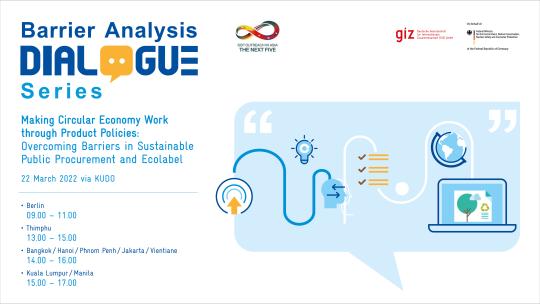Barrier Analysis Dialogue Series: Making Circular Economy work in the product policy
Overcoming the barriers in Sustainable Public Procurement and Ecolabels
Asia/Kuala_Lumpur: 3:00 - 5:00pm
Asia/Manila: 3:00 - 5:00pm
Europe/Berlin: 8:00 - 10:00am

Background
In unregulated markets, environmental and social costs of the production of a product or delivery of a service are not borne completely by the companies responsible for bringing them to the market. These costs are rather passed on to the society and future generations. This possibility of externalizing the environmental and social costs of products and services is one of the major hurdles for overcoming the unsustainable linear take-make-waste economy. Companies’ efforts to reduce the environmental impact, resource and energy consumption of their products and services do not offer them enough economic incentives and competitive advantages in the market.
Also, in our current make-take-waste economy the value of a product is generated by selling it. This generates incentives to design products with low material and production costs, while the durability or the use-costs (e.g. energy consumption) of a product is of less relevance. Therefore, products break easily and are inefficient. On the consumer side, the value generation through selling creates an incentive to buy low-cost, i.e. the most competitive product at the point of sale. This type of value creation incentivizes more externalization of environmental costs and is called split-incentive dilemma.
Externalized costs incentivized by the split-incentive dilemma are key reasons that the market share of sustainable products continues to be very low. The vision of making a circular economy a societal norm is still quite far from being realized, if we don’t change the incentives in the economy.
Many policy measures need to be applied to internalize such external (and hidden) costs, i.e. to ensure that products and services are sold at their “true prices” encompassing environmental and social costs (today and in the future). Examples include:
- Price increases for products, works or services that lead to pollution (e.g., CO2 tax, tax on primary resources, CO2 emission certificates);
- Price incentives for environment-friendly products (e.g., tax reduction for repairs and repair businesses, reduced levies for environment-friendly packaging);
- Incentivizing the change in the value creation from selling a product to selling its function, since this will reverse the incentives;
- Implementing regulatory legislation that limits the negative impact of product groups effectively (e.g., minimum mandatory ecodesign standards, extended producer responsibility);
- Decrease of subsidies that support polluting economic activities (e.g., subsidies on energy prices)
At the same time, countries worldwide have started to realize the importance of implementing a circular economy, also against the background of their pledges to limit climate change. Estimates suggest that a consistently implemented circular economy has the potential to reduce global greenhouse gas emissions by almost 40% and the raw material consumption by almost 30%. Few examples of policies incorporating circular economy as one of the core strategies include the EU Green Deal, 12th Malaysia Plan and Thailand’s Bio-Circular-Green (BCG) Strategy.
In this episode, we will discuss how some companies with progressive and innovative ideas and policymakers are working in conjunction to support the transition to a circular economy. The episode will look into their specific strategies and challenges in overcoming the barrier of competing with unsustainable business models in the market and hear about requirements for creating a level-playing field by internalizing the external costs.
The Dialogue Series is part of the projects “Proliferation of Sustainable Consumption and Production (SCP) in Asia – the Next 5 Countries (SCP Outreach)” and “Scaling Sustainable Consumption and Production (SCP): Ecolabelling and Sustainable Public Procurement for a Low-Carbon Pathway in South-East Asia (Scaling SCP), commissioned by the German Federal Ministry for the Environment, Nature Safety and Consumer Protection (BMUV). The goal is to highlight the barriers, strategies and potentials for realizing circular economy principles by effectively designing and implementing a sustainable product policy framework.
Objectives
- To accrue policymakers, experts, businesses and practitioners passionate about SPP and EL to influence consumption patterns to minimize the environmental damage caused by goods and services
- To be inspired by country cases on policies, regulations, best practices, and business models that foster the implementation of EL and SPP
- To expand understanding and learn about common barriers in their implementation and possible strategies for successfully overcoming these barriers
Target Groups
- Policy- and decision makers, civil servants and practitioners from the ASEAN region, but also across the world, developing SPP and EL systems.
- Business associations, companies, organisations and individuals who are passionate about the topic of EL and SPP.
Agenda
|
Time (UTC+7) |
Activity |
|
14.00 – 14.05 |
Greetings and Welcome by Moderator |
|
14.05 – 14.10 |
About the Dialogue Series |
|
14.10 – 14.25 |
Keynote on “Making Circular Economy work in the product policy: |
|
14.25 – 14.40 |
CE forerunner presenting the textile services as an example of internalising external environmental costs |
|
14.40 – 14.55 |
CE forerunner presenting barriers and solutions using CE business models to overcome the split-incentive dilemma Paolo Toppan, SUCCESS ELECTRONICS |
|
14.55 – 15.05 |
Q & A |
|
15.05 – 15.20 |
Overcoming CE barriers through policies: The EU perspective on ICT
Sören Enholm, CEO, TCO Development |
|
SEA perspective on CE product policies: 12th MY Plan on CE focussing on product policies through EL and SPP Malik Atan, Head of Sustainable Consumption & Production, Malaysian Green Technology and Climate Change Corporation (MGTC) |
|
15.35 – 15.50 |
Q & A |
|
15.50 – 16.00 |
Wrap Up and Closing by the Moderator |